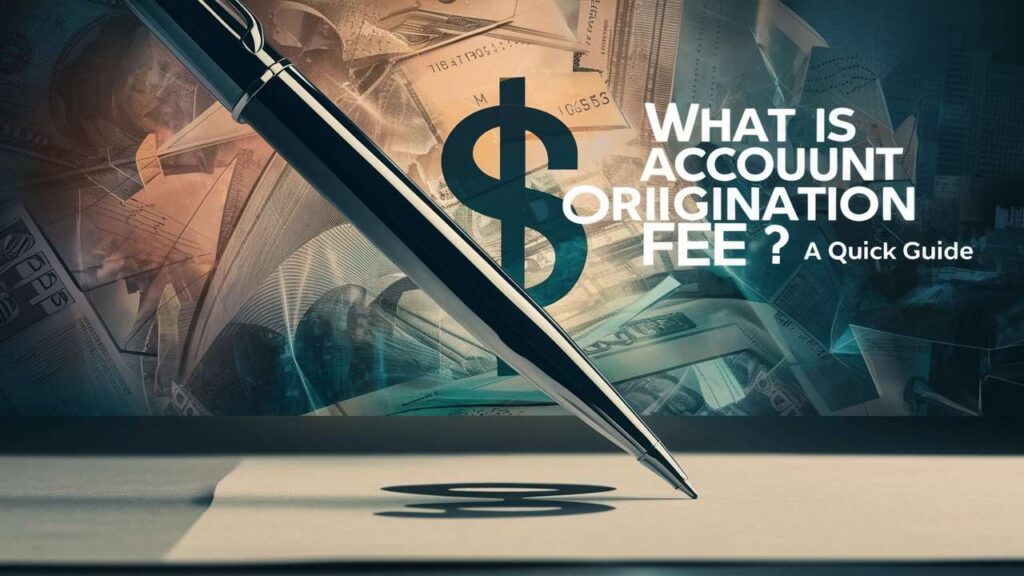Why You Need to Know About Account Origination Fees
Ah, the infamous account origination fee. It sounds harmless, right? A few bucks here, a small percentage there💱but over time, these fees can quietly drain your wallet. Whether you’re applying for a mortgage, a car loan, or a personal loan, this seemingly small charge can make a big dent in your finances. Understanding what an account origination fee is and how to handle it can save you from unnecessary costs and even help you negotiate a better deal.

The Basics: What Exactly is an Account Origination Fee?
At its core, an account origination fee is a fee charged by a lender for processing your loan application. Think of it as the price you pay for them doing all the paperwork, checking your credit, and ensuring everything is in order. It’s typically a percentage of the loan amount💱usually around 1-5%. In simple terms, it’s the lender’s way of saying, “Hey, thanks for letting us loan you money. Now, pay us for it.”
Breaking Down the Term: “Account,” “Origination,” and “Fee”
Let’s dissect this term like a science experiment. “Account” refers to the loan or financial product you’re applying for. “Origination” is the act of starting or initiating something💱in this case, your loan. And “Fee”? Well, that’s just a fancy word for extra money you have to cough up. Together, they form a trifecta of costs you need to be aware of before signing on the dotted line.
Why Do Lenders Charge an Account Origination Fee?
Lenders charge origination fees to cover the administrative costs of processing a loan. They’re not doing all that paperwork for free, after all. Credit checks, underwriting, and loan processing are labor-intensive tasks. However, let’s be honest: part of it is just another way for lenders to pad their profits. It’s their way of ensuring they make money, even if you decide to pay off your loan early or refinance down the road.

Is This Fee Legit? A Quick Look at Regulations
Good news: yes, the account origination fee is legit. Bad news: it’s regulated, but not always in ways that protect you. In the U.S., origination fees are governed by federal and state laws, but the exact terms and amounts can vary wildly. The Truth in Lending Act (TILA) requires lenders to disclose these fees upfront, so while they can’t sneak it in at the last minute, they can still charge a hefty fee if they choose.
How Much Does an Account Origination Fee Typically Cost?
The cost of an account origination fee can vary depending on the type of loan and the lender’s policies. For personal loans, you can expect a fee ranging from 1-8% of the loan amount. For mortgages, it’s typically around 0.5-1% of the loan value. Car loans? Slightly lower, but still painful. While these percentages may seem small, on larger loans, that can mean hundreds or even thousands of dollars.

Where You’ll Encounter an Account Origination Fee: Common Scenarios
These fees pop up in various forms, but you’re most likely to see them in:
- Mortgage loans
- Personal loans
- Car loans
- Student loans
Lenders may also charge origination fees for refinancing loans, home equity lines of credit (HELOC), and sometimes even credit cards. Basically, if it involves borrowing money, there’s a chance an origination fee is lurking in the shadows.
The Mortgage Maze: Account Origination Fees in Home Loans
In the complex world of mortgages, origination fees are a common (and often hefty) cost. Typically, they’re around 0.5-1% of the loan amount, but can be higher depending on your lender and loan type. While they’re standard, you can sometimes negotiate these fees or roll them into your mortgage to ease the upfront burden.

Car Loans and Account Origination Fees: What to Watch For
Car loans often come with smallerorigination fees compared to mortgages, but they’re still worth watching. Some dealerships may try to slip in additional fees under the guise of loan origination, so it’s important to ask questions and read the fine print. If you see anything labeled as an “administration fee,” question it immediately.
Personal Loans: Sneaky Fees You Should Know About
With personal loans, origination fees are often unavoidable but can range anywhere from 1-8%. If you’re looking for a small personal loan, this fee can make a big difference. It’s crucial to shop around, as some online lenders offer no origination fees, but they might compensate with higher interest rates.
Credit Cards and Origination Fees: Are They a Thing?
While it’s rare, some credit cards💱especially those for people with bad credit💱may sneak in an origination fee disguised as a processing or setup fee. These aren’t as common as in loans, but it’s still something to keep an eye on, particularly with secured credit cards.

Can You Avoid an Account Origination Fee Altogether?
Yes, it is possible to avoid these fees, but it’s not always easy. You can try negotiating with your lender, particularly if you have excellent credit. Some online lenders offer “no-fee” loans, but be careful💱these often come with higher interest rates, so you may pay in other ways.
Negotiating the Fee: Tactics for Lowering or Waiving the Charge
Negotiation is key. Ask your lender if they can waive or reduce the origination fee, especially if you have good credit or are borrowing a significant amount. Also, get quotes from multiple lenders and use them as leverage. No one likes losing a potential customer to a competitor.💱
The Fine Print: How to Spot an Account Origination Fee in Contracts
Always, always read the fine print. Lenders are required to disclose all fees in loan agreements, but they often bury them deep within pages of jargon. Look for terms like “origination fee,” “administration fee,” or “processing charge” in your contract before signing anything.
Are Account Origination Fees Refundable? The Real Story
Spoiler alert: they’re generally not refundable. Once you’ve paid the origination fee, that money is gone. However, if your loan doesn’t go through, some lenders might refund it, but this is the exception rather than the rule.
The Hidden Costs of an Account Origination Fee: Is It Worth It?
An origination fee can add up quickly, especially on large loans. Beyond the immediate cost, these fees can affect your loan’s annual percentage rate (APR), making your overall borrowing more expensive. In some cases, it’s worth paying the fee if it leads to lower interest rates, but always do the math first.

What Does an Account Origination Fee Cover? Services You’re Paying For
The fee typically covers services such as:
- Credit checks
- Administrative costs
- Underwriting
- Loan processing
In other words, it’s the price you pay for the lender doing their job. While these services are essential, the fee itself can feel like an unnecessary expense, especially when lenders tack on other charges.
Account Origination Fee vs. Application Fee: Know the Difference
Origination fees and application fees are not the same, although they often get confused. An application fee is what you pay simply for submitting a loan application, whether or not you’re approved. The origination fee, on the other hand, is charged only once the loan is processed and approved.
When It Makes Sense to Pay an Account Origination Fee
Sometimes paying the fee makes sense. If you’re getting a low-interest rate or favorable loan terms that outweigh the cost of the fee, it might be worth it. This is especially true with large, long-term loans like mortgages, where even a small reduction in interest rates can save you thousands over time.
How Account Origination Fees Impact Your Loan Repayment
While it’s an upfront cost, an origination fee can affect your loan’s overall cost. Some lenders allow you to roll the fee into the loan, but this will increase the amount you owe💱and you’ll pay interest on it too. It’s important to calculate how much this will add to your repayment schedule.
What Happens If You Refuse to Pay the Fee? Consequences and Risks
Refusing to pay the origination fee usually means your loan won’t go through. Lenders typically won’t waive this fee unless you negotiate upfront. In rare cases, refusing to pay may lead to losing out on a loan entirely, so be prepared to either negotiate or accept the fee.
Online vs. Traditional Lenders: Who Charges More in Origination Fees?
Online lenders are often more competitive when it comes to origination fees. Traditional banks tend to charge higher fees to cover their operational costs, while online lenders, with fewer overheads, can offer lower or even no origination fees. However, watch out for hidden charges with online services.
A Global Perspective: Are Account Origination Fees Standard Worldwide?
Origination fees are not just a U.S. phenomenon. Many countries have similar charges, though the specifics vary. In Europe, origination fees are often lower but still present. In emerging markets, these fees can be even higher due to added risk for lenders.
How to Calculate the Real Cost of an Account Origination Fee
To calculate the real cost, multiply the fee percentage by your loan amount. For example, if you’re taking out a $10,000 loan with a 3% origination fee, you’ll pay $300 upfront. Don’t forget to factor this into your loan’s total cost, as it can impact your overall repayment plan.
Common Myths About Account Origination Fees Debunked
Myth #1: All lenders charge the same origination fee.
Myth #2: Origination fees are unavoidable.
Myth #3: Lower origination fees mean better loan terms.
In reality, these fees can vary greatly, and shopping around can help you find a deal that suits your financial needs.
When to Walk Away: Red Flags That the Fee Is Too High
If your origination fee seems unusually high💱anything over 5% should raise eyebrows💱it’s time to walk away. Additionally, if the lender refuses to explain the fee or bundle it with other unnecessary charges, consider it a red flag and explore other options.
Conclusion: Understanding Account Origination Fees to Make Smarter Financial Decisions
Origination fees can feel like a hidden tax on borrowing money, but understanding them can help you make more informed choices. Don’t let these fees catch you off guard💱always read the fine print, negotiate where possible, and make sure the fee is worth the loan’s overall cost.
Final Thoughts: Is an Account Origination Fee a Dealbreaker?
An account origination fee doesn’t have to be a dealbreaker, but it should be factored into your decision. By knowing what to expect and how to manage these fees, you can take control of your financial future, one smart decision at a time.
People Also Ask
What is the 5% origination fee?
A 5% origination fee means the lender charges you 5% of the total loan amount to process and approve your loan. For example, if you borrow $10,000, the origination fee would be $500.
What is the 3% origination fee?
A 3% origination fee indicates that the lender takes 3% of your loan as a fee for processing it. If you’re borrowing $15,000, the fee would amount to $450.
Is an origination fee worth it?
An origination fee can be worth it if the loan terms, such as a lower interest rate, outweigh the upfront cost. Always calculate the long-term impact before agreeing to the fee.
What is a 1% origination fee?
A 1% origination fee is a charge that equals 1% of the total loan amount. For instance, if your loan is $20,000, the fee would be $200. This is often considered a relatively low origination fee.
What is a 10% origination fee?
A 10% origination fee is quite steep, meaning you’d pay 10% of the loan amount upfront. For example, a $5,000 loan would come with a $500 fee, making it significantly expensive.
How to calculate origination fee?
To calculate an origination fee, multiply the loan amount by the fee percentage. For example, if you have a $10,000 loan and the fee is 3%, multiply $10,000 by 0.03 to get a $300 fee.
What is the meaning of origination fee?
An origination fee is a charge imposed by lenders to cover the cost of processing and approving a loan. It’s typically a percentage of the loan amount and is often included in mortgage, personal, and auto loans.
Who paid the origination fee?
The borrower is responsible for paying the origination fee. It is usually deducted from the loan amount before the funds are disbursed, meaning you receive slightly less than you borrow.
What is the origination fee in accounting?
In accounting, an origination fee is treated as a loan expense and is often amortized over the life of the loan. For the borrower, it can reduce the net loan amount, while for the lender, it’s considered income.
How can I avoid origination fees?
To avoid origination fees, shop around for lenders that don’t charge them, such as certain online lenders. Alternatively, negotiate with your lender to reduce or waive the fee, especially if you have good credit.
Do you pay back the origination fee?
No, you do not pay back the origination fee directly. It’s usually deducted from the loan amount before disbursement, meaning you receive less upfront, but you repay the full loan balance.
What are the three types of fees?
Three common types of loan-related fees are:
- Origination fees (for processing the loan)
- Application fees (for submitting a loan application)
- Late payment fees (for missed or delayed payments)
What is 0.75 of the loan amount points?
A 0.75-point fee on a loan means 0.75% of the loan amount is charged as a fee. For a $100,000 loan, this would amount to $750.
What is origination in finance?
In finance, origination refers to the process by which a lender creates a loan, from assessing the borrower’s creditworthiness to processing paperwork and disbursing funds.
What is the full meaning of LTV?
LTV stands for Loan-to-Value ratio. It’s a financial term that measures the ratio of a loan to the value of the asset being purchased, such as a home. A lower LTV typically means less risk for lenders.









